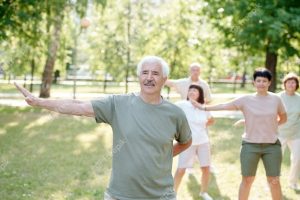Increase Physiological and Psychological Activation and Calmness with Qigong
By John M. de Castro, Ph.D.
“regular [qigong] practice may help improve your balance, ease stress and anxiety, sharpen focus, and reduce your risk of chronic disease.” – Saundra Montijo
Qigong has been practiced for thousands of years with benefits for health and longevity. Qigong training is designed to enhance function and regulate the activities of the body through regulated breathing, mindful concentration, and gentle movements. Only recently though have the effects of these practices been scrutinized with empirical research. This research has found that they are effective for an array of physical and psychological issues.
In today’s Research News article “Relaxation or Regulation: The Acute Effect of Mind-Body Exercise on Heart Rate Variability and Subjective State in Experienced Qi Gong Practitioners.” (See summary below or view the full text of the study at: https://www.ncbi.nlm.nih.gov/pmc/articles/PMC8208883/ ) Goldbeck and colleagues recruited experienced adult Qigong practitioners and measured their heat rate variability with the electrocardiogram (ECG) while at rest, during 2 10-minute sessions of qigong practice, and at rest again. Before and after the practices they completed measures of vitality, calmness, deep relaxation, meditative focus, and heightened body awareness.
They found that after the 10-minute qigong practices there were significant increases in vitality, calmness, pleasant body sensation, focused attention, body awareness, and perceived body activation. In addition, during the qigong sessions there was a significant decrease in heart rate variability. A decrease in heart rate variability is indicative of increased physiological activation (sympathetic nervous system activation).
The results are interesting and suggest that experienced qigong practitioners experience increases in both psychological and physiological activation in association with feelings of calmness during engagement in the practice. The physiological arousal is suggestive of the aerobic exercise component of qigong. It is interesting that calmness increased in synchrony with increased vitality and perceived body activation. This is suggestive of a state of “eutonic calmness” wherein activity is associated with pleasant calm feelings which has been postulated to be characteristic of mind-body exercises.
So, increase physiological and psychological activation and calmness with qigong.
“a little bit of regular practice, Qigong can have a powerful effect on mind, body and spirit. Reported benefits have included increased general health and well being, reduced levels of stress, and a brighter and more balanced outlook on life’s possibilities.” – Mei Quan
CMCS – Center for Mindfulness and Contemplative Studies
This and other Contemplative Studies posts are available on Twitter @MindfulResearch
Study Summary
Goldbeck, F., Xie, Y. L., Hautzinger, M., Fallgatter, A. J., Sudeck, G., & Ehlis, A. C. (2021). Relaxation or Regulation: The Acute Effect of Mind-Body Exercise on Heart Rate Variability and Subjective State in Experienced Qi Gong Practitioners. Evidence-based complementary and alternative medicine : eCAM, 2021, 6673190. https://doi.org/10.1155/2021/6673190
Abstract
Mind-body exercises such as Yoga or Qi Gong have demonstrated a wide range of health benefits and hold great promise for employment in clinical practice. However, the psychophysiological mechanism underlying these effects remains unclear. Theoretical frameworks highlight regulation as a characteristic and specific mechanism of mind-body exercise for which empirical evidence is scarce. To investigate the exact nature of this mechanism, we tracked acute changes in autonomic nervous system (ANS) activity and subjective state over a common form of mind-body exercise (Qi Gong). Heart rate variability (HRV) and subjective state were assessed in 42 Qi Gong practitioners from China and Germany during a standard moving Qi Gong exercise (Baduanjin). Relaxation in supine position prior and after the exercise served as a control condition to Qi Gong and to assess changes before and after the exercise. Following Qi Gong, all practitioners reported significantly increased subjective calmness and perceived body activation, attentional focus, and subjective vitality. On the physiological level, a significant decrease of parasympathetic modulation and increase in heart rate indicated a pattern of moderate general physiological activation during Qi Gong. A significant increase in overall RR-interval modulation and cardiac coherence during Qi Gong were indicative of a mechanism of active regulation. Examination of the RR-interval trajectories revealed a rhythmic pattern of ANS activation and deactivation in sync with activating and relaxing segments of the exercise. Significant changes in subjective state, not on the physiological level, before and after the exercise were observed. Significant associations between Qi-Gong-specific beliefs, age, cultural background, and experiential and physiological measures demonstrated the complexity of mind-body exercises as multicomponent interventions. Overall, this study highlights moderate general physiological activation, exercise-dependent rhythmic ANS modulation, and induction of a characteristic state of eutonic calmness as potential psychophysiological mechanisms underlying the health benefits of mind-body exercise.
https://www.ncbi.nlm.nih.gov/pmc/articles/PMC8208883/
